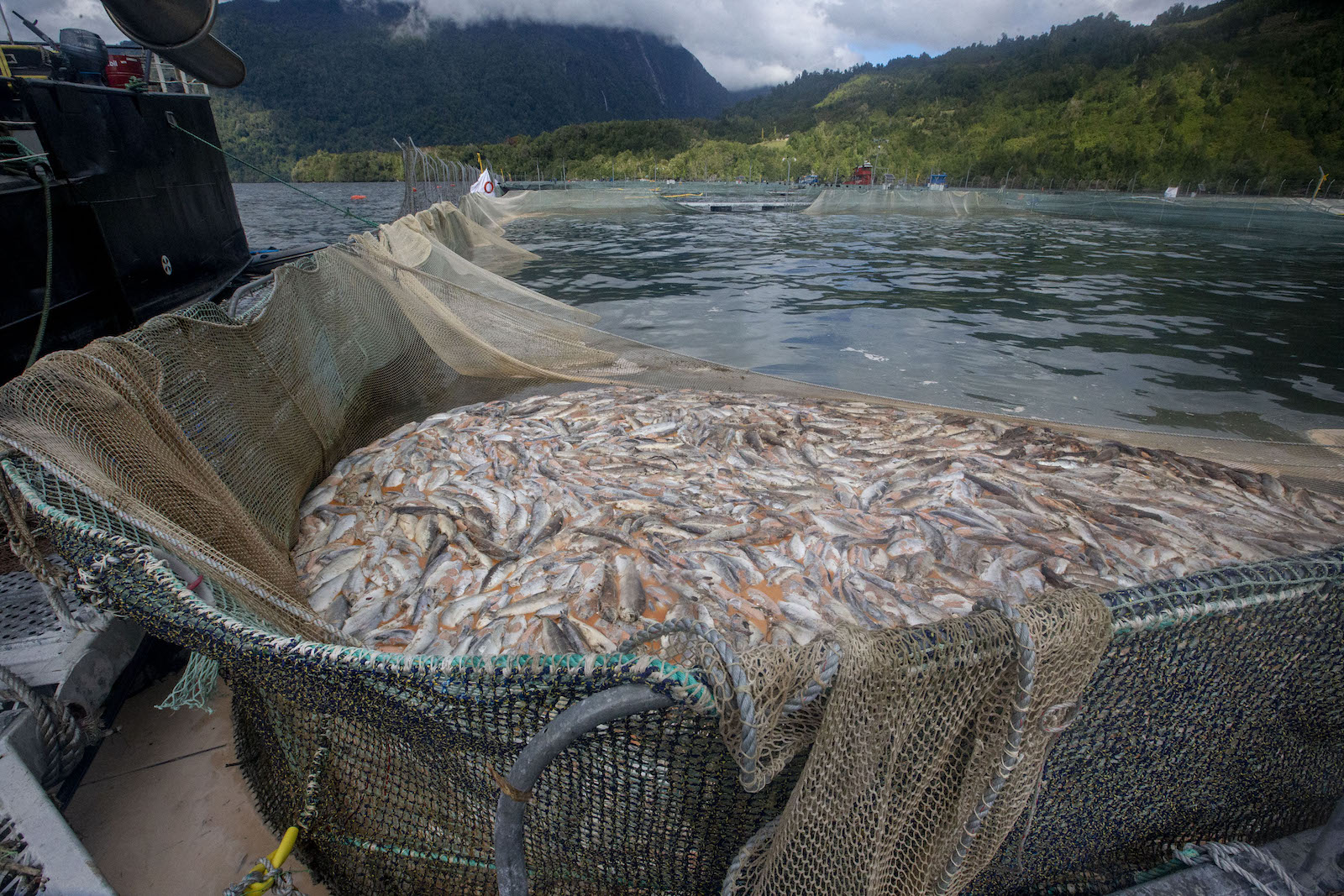Chile’s salmon difficulties continue
Las impactantes imágenes desde el centro de cultivo de la empresa Camanchaca en el sector de Porcelana, en el Fiordo Comau, en donde se pueden presenciar los niveles de putrefacción que tienen los salmones muertos, y como en el proceso de aspirado de estos para su retiro, se vierten al mar, fuera de las jaulas, donde además se pueden ver aguas contaminadas con restos biológicos
«The international community, which serves as a market for Chilean salmon, can leverage its economic power to convince Chile to take actions in order to protect this unique biodiversity hotspot from the environmental effects of salmon aquaculture.”
Patagon Journal -Sunday, 26 September 2021
Alarms went off in March when the usual blue waters of the Comau Fjord were transformed into a brown tide in a coastal zone close to where Chile’s Carretera Austral, or Southern Highway, begins in the Palena province. An environmental emergency was declared, with concern not just for the ecosystem, but the expanding aquaculture sector in the area witnessed the contamination of a dozen salmon farming centers leading to the death of more than 2.2 million kilos of fish.
Scientists say the event is due to a harmful algal bloom, which are often the result of natural processes, but climate change is increasingly playing a significant role as this destructive phenomenon is happening with greater frequency along coasts dominated by salmon farms.
The situation worsens near salmon farms in Chile because algae in the waters feed on enormous quantities of organic matter generated by the aquaculture industry, which is releasing a mixture of salmon feces and food not consumed by the fish, which in turn exponentially increases the reproduction of toxic algae that give rise to «dead zones» where salmon and other species simply can no longer breathe.
There are also social, labor and community concerns. «The promise was an industry that would have first-world working conditions, strengthen Chilean food sovereignty, and contribute to eradicating poverty in local economies,» says Juan Carlos Cárdenas, director of the Santiago-based Ecocéanos, about the salmon industry model. Cardenas points in particular at the precarious working conditions at the salmon farms in the country, which have a high rate of accidents and illnesses. Between 2013 and 2019, an astounding 43 workers were killed in salmon farm accidents. In addition, he points out that the island of Chiloé, held up as an example of successful economic development thanks to salmon farming, is today one of the three poorest regions in the country.
 Photo: Alvaro Vidal
Photo: Alvaro Vidal
The complications of the salmon industry now extend to the southernmost reaches of Patagonia. One of the most controversial new conflicts is inside the Kawésqar National Reserve, home to an ancient indigenous tribe of the same name that is dwindling in numbers.
Indigenous complaints
A recent joint report by the Kawésqar Communities for the Defense of the Sea and National Geographic Pristine Seas urgently calls on the Chilean government not to approve any more salmon farming concession applications. Says David Alday, leader of the Yagan community of Bahía Mejillones, about the salmon concessions in this zone: «They were installed illegally, they arrived without indigenous consultation, and when we got into the legal issue, it was a shock to see the number of irregularities they presented. What we are doing is getting ahead of an environmental disaster like that of Chiloé or Comau.”
Adds Leticia Caro, a leader of the Kawésqar people: «We have witnessed the decline of native species that we ourselves fish, such as snook and pejereyes, choros and cholgas. As a result, many indigenous fishermen have had to give up their livelihood and start working in the salmon industry. That is enslaving a free man.»
There is also growing international pressure from the scientific community. In May, two ecology professors at the Universidad Austral in Valdivia, Chile, Juan Navedo and Luis Vargas, published a letter in the prestigious international journal Science in which they call for a halt to the expansion of the salmon industry and made an appeal to international consumers to exert pressure on the troubled industry.
They wrote, in part: «The international community, which serves as a market for Chilean salmon, can leverage its economic power to convince Chile to take actions in order to protect this unique biodiversity hotspot from the environmental effects of salmon aquaculture.”
Navedo told Patagon Journal: «It is urgent to rethink salmon farming in Chile, taking into account all its actors: producers, consumers, and above all the people who inhabit the territories. At the moment, the only thing that prevails is volume production and this strategy is bringing socio-environmental costs that we do not even understand.”





